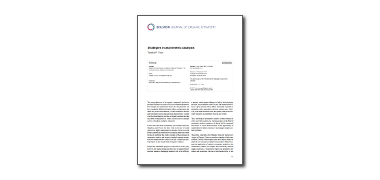Adaptive experimentation and optimization in organic chemistry

Prof. Philippe Schwaller, École Polytechnique Fédérale de Lausanne (EPFL)
Prof. Artur M. Schweidtmann, Delft University of Technology
Recent advancements in lab automation and machine learning have transformed organic chemistry. Closed-loop systems can autonomously design and execute experiments, leading to increased productivity. At the same time, machine learning can capture complex underlying relationships, guide decision-making, and enable accelerated discovery. However, to further enhance optimization performance, the integration of human expertise and prior knowledge could be leveraged. This can be achieved through hybrid human–AI approaches that combine the strengths of both humans and machines, through human-in-the-loop optimization that leverages the insights of experienced chemists or transfers learning from previous optimization campaigns. These approaches can help the system find promising regions of the search space more efficiently and handle unanticipated situations, making success more probable.
This thematic issue aims to explore recent advances in adaptive experimentation, automation, and synergetic human–AI approaches in organic chemistry. The focus will be on how these approaches can improve the efficiency and quality of research and accelerate the discovery of new molecules and reactions. The topics of interest include, but are not limited to:
- AI tools for the discovery of new molecules and reactions
- Intelligent automated discovery (exploration of chemical space, symbolic regression, etc.)
- High-throughput experimentation (validation and optimization of experiments, design and implementation of closed-loop systems, automation and robotics for self-driving labs and flow chemistry, etc.)
- Optimization algorithms for closed-loop experimentation systems (Bayesian optimization, reinforcement learning, model-based design of experiments, etc.)
- Integration of human expertise in automation processes (development of hybrid human–AI approaches)
Adaptive experimentation and optimization in organic chemistry
- Artur M. Schweidtmann and
- Philippe Schwaller
Beilstein J. Org. Chem. 2025, 21, 2367–2368, doi:10.3762/bjoc.21.180

pKalculator: A pKa predictor for C–H bonds
- Rasmus M. Borup,
- Nicolai Ree and
- Jan H. Jensen
Beilstein J. Org. Chem. 2024, 20, 1614–1622, doi:10.3762/bjoc.20.144
Finding the most potent compounds using active learning on molecular pairs
- Zachary Fralish and
- Daniel Reker
Beilstein J. Org. Chem. 2024, 20, 2152–2162, doi:10.3762/bjoc.20.185

Catalysing (organo-)catalysis: Trends in the application of machine learning to enantioselective organocatalysis
- Stefan P. Schmid,
- Leon Schlosser,
- Frank Glorius and
- Kjell Jorner
Beilstein J. Org. Chem. 2024, 20, 2280–2304, doi:10.3762/bjoc.20.196

Homogeneous continuous flow nitration of O-methylisouronium sulfate and its optimization by kinetic modeling
- Jiapeng Guo,
- Weike Su and
- An Su
Beilstein J. Org. Chem. 2024, 20, 2408–2420, doi:10.3762/bjoc.20.205
Machine learning-guided strategies for reaction conditions design and optimization
- Lung-Yi Chen and
- Yi-Pei Li
Beilstein J. Org. Chem. 2024, 20, 2476–2492, doi:10.3762/bjoc.20.212

Computational design for enantioselective CO2 capture: asymmetric frustrated Lewis pairs in epoxide transformations
- Maxime Ferrer,
- Iñigo Iribarren,
- Tim Renningholtz,
- Ibon Alkorta and
- Cristina Trujillo
Beilstein J. Org. Chem. 2024, 20, 2668–2681, doi:10.3762/bjoc.20.224

Emerging trends in the optimization of organic synthesis through high-throughput tools and machine learning
- Pablo Quijano Velasco,
- Kedar Hippalgaonkar and
- Balamurugan Ramalingam
Beilstein J. Org. Chem. 2025, 21, 10–38, doi:10.3762/bjoc.21.3










































































